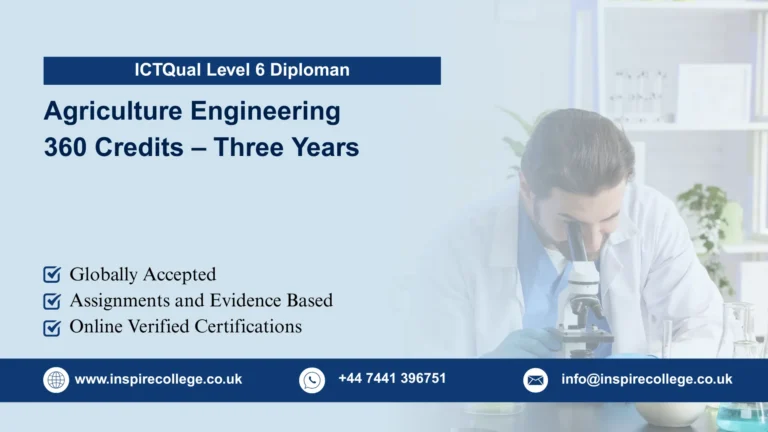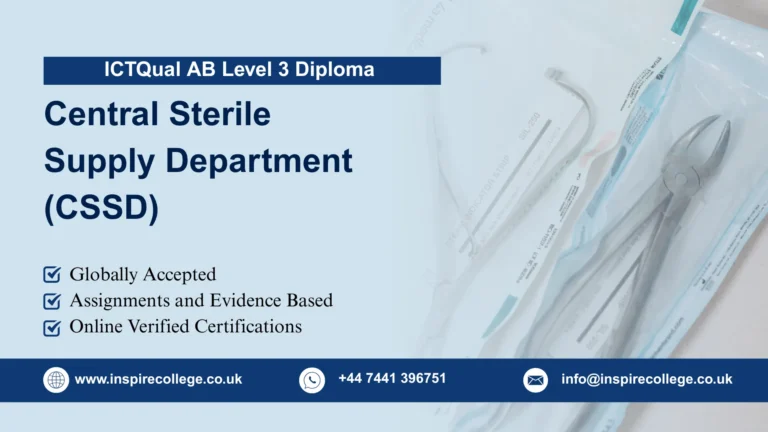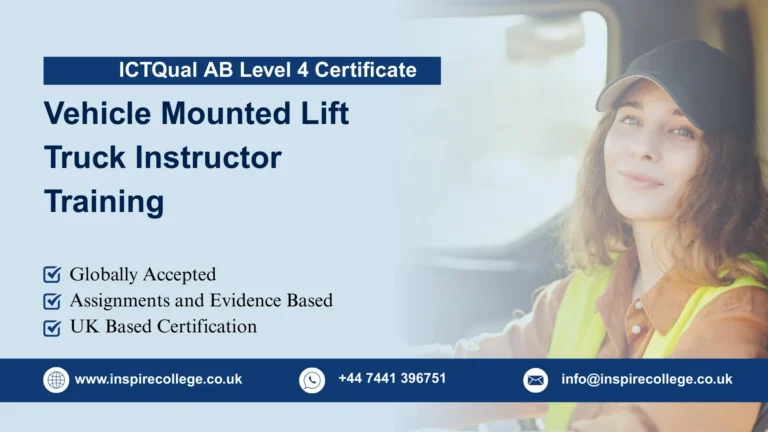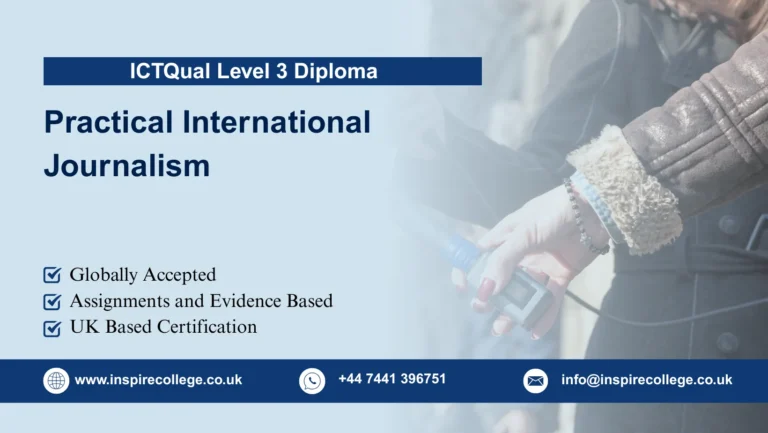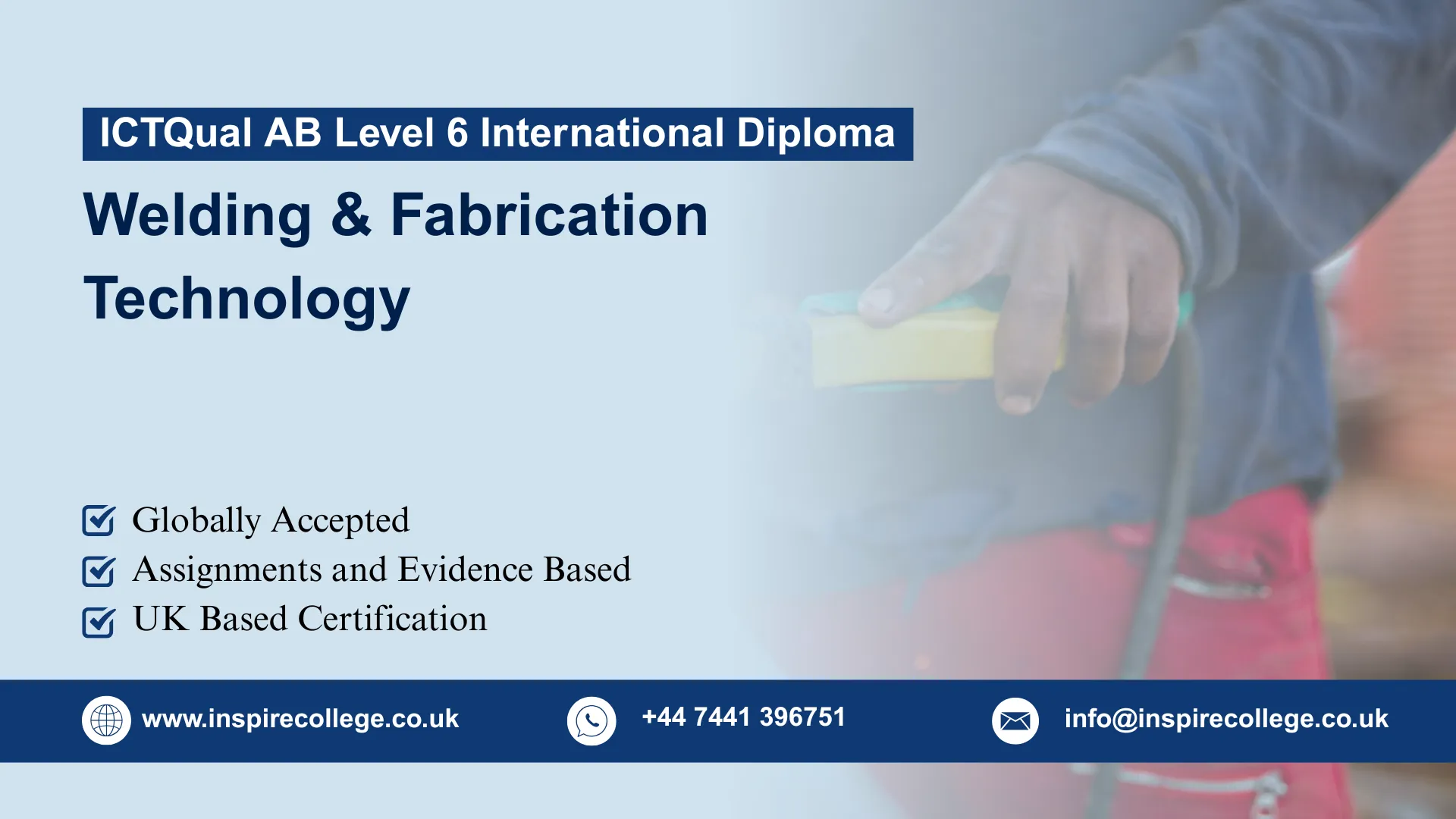
ICTQual AB Level 6 International Diploma in Welding & Fabrication Technology
The ICTQual AB Level 6 International Diploma in Welding & Fabrication Technology is a globally recognised programme designed to equip learners with advanced technical knowledge and practical skills in welding, metal fabrication, and structural engineering. Spanning three years and 360 credits, this diploma provides a comprehensive curriculum tailored for both fresh learners and experienced professionals seeking to advance their careers in industrial fabrication, manufacturing, and engineering sectors.
This Welding & Fabrication Technology programme delivers a robust foundation in welding processes, metallurgy, fabrication techniques, quality control, and industrial safety standards. Learners gain hands-on experience with cutting-edge welding technologies, fabrication tools, and industry-standard safety practices. The course also emphasises critical skills such as project planning, design interpretation, structural analysis, and compliance with international welding codes, preparing graduates to excel in real-world fabrication and engineering environments.
Upon completion, learners are equipped to pursue a wide range of career opportunities, including Welding Engineer, Fabrication Specialist, Structural Technician, Quality Control Inspector, or Project Manager. The qualification also enhances international employability, providing recognition across industrial, construction, and manufacturing sectors worldwide.
Key benefits of Welding & Fabrication Technology programme include practical, industry-aligned training, advanced technical competencies, and strategic project management skills, enabling learners to contribute effectively to welding and fabrication operations, structural projects, and manufacturing innovation. Whether you are starting your career or aiming to step into senior technical or supervisory roles, the ICTQual AB Level 6 International Diploma in Welding & Fabrication Technology offers the knowledge, credibility, and global recognition to succeed in today’s competitive industrial landscape.
The ICTQual AB Level 6 International Diploma in Welding & Fabrication Technology is designed for learners committed to developing advanced technical skills, practical expertise, and professional competence in welding, metal fabrication, and industrial engineering. Entry requirements ensure that learners are prepared to succeed in this comprehensive three-year, 360-credit programme.
Age Requirement
- Learners must be at least 18 years old to enrol in the Welding & Fabrication Technology programme.
Educational Background
- Applicants are expected to have a recognised Level 5 qualification in welding, fabrication, mechanical engineering, or related technical fields.
- Equivalent professional certifications or diplomas in manufacturing, metalworking, or industrial operations may also be considered.
- Learners without formal qualifications but with significant verifiable industry experience may be eligible under the experienced professional route.
Professional Experience
- Fresh Learners: Suitable for individuals starting their career in welding, fabrication, or manufacturing, who wish to gain foundational and advanced skills through the full programme.
- Experienced Professionals: Learners with at least 6 years of verifiable work experience in welding, metal fabrication, or industrial manufacturing can apply for recognition of prior learning for fast-tracked certification.
Additional Requirements
- Proficiency in English, both written and spoken, to effectively engage with course materials, assessments, and professional communication.
- Basic computer literacy, including familiarity with Microsoft Office and online learning platforms, for assignments, reports, and research projects.
- Commitment to completing the three-year, 360-credit programme, including assignments, practical tasks, and capstone projects.
- Strong interest in industrial safety, quality control, and precision fabrication techniques within welding and fabrication operations.
This entry profile ensures learners are prepared to handle the technical, theoretical, and practical aspects of the diploma while meeting international industry standards in welding and fabrication technology.
Mandatory Units
This qualification, the ICTQual AB Level 6 International Diploma in Welding & Fabrication Technology, consists of 36 mandatory units.
Year 1 – Foundation in Welding & Fabrication
- Introduction to Welding and Fabrication Technology
- Engineering Materials and Metallurgy
- Workshop Safety and Health Practices
- Basic Welding Techniques and Processes
- Metal Cutting and Shaping Methods
- Technical Drawing and Blueprint Interpretation
- Measurement and Quality Control in Fabrication
- Introduction to Welding Equipment and Tools
- Welding Metallurgy and Defects
- Fundamentals of Fabrication Design
- Industrial Mathematics for Fabrication
- Communication and Professional Skills
Year 2 – Intermediate Welding & Fabrication
- Advanced Welding Processes
- Gas Welding and Cutting Techniques
- Arc Welding and TIG/MIG Methods
- Welding Inspection and Testing
- Structural Fabrication Principles
- Sheet Metal Fabrication Techniques
- Welding Codes, Standards, and Regulations
- Welding Project Planning and Management
- Welding Metallurgy – Advanced Concepts
- Fabrication Automation and Machinery
- Health, Safety, and Risk Management in Welding
- Problem-Solving and Technical Decision Making
Year 3 – Advanced Welding & Fabrication
- Fabrication Design and Project Execution
- Advanced Structural Welding Techniques
- Pipe and Pressure Vessel Welding
- Welding Metallurgy – Failure Analysis
- Robotic Welding and Automation Technology
- Quality Assurance and Industry Standards
- Welding Project Management and Leadership
- Advanced Fabrication for Construction and Industry
- Cost Estimation and Resource Planning
- Research and Innovation in Welding Technology
- Capstone Project in Welding & Fabrication
- Professional Development and Career Planning
Learning Outcomes for the ICTQual AB Level 6 International Diploma in Welding & Fabrication Technology:
Year 1 – Foundation in Welding & Fabrication
Introduction to Welding and Fabrication Technology
- Understand the principles and scope of welding and fabrication.
- Recognise different welding techniques and their applications.
- Identify industry sectors using welding and fabrication processes.
- Understand safety and environmental considerations in welding operations.
Engineering Materials and Metallurgy
- Identify and classify metals, alloys, and non-metallic materials.
- Understand material properties such as strength, ductility, and hardness.
- Apply metallurgical principles to select suitable materials for fabrication.
- Analyse the effects of heat and welding on material properties.
Workshop Safety and Health Practices
- Implement safe practices in welding workshops.
- Identify potential hazards and apply risk control measures.
- Use personal protective equipment (PPE) correctly.
- Comply with health and safety legislation and regulations.
Basic Welding Techniques and Processes
- Perform fundamental welding processes safely.
- Understand joint types and welding positions.
- Demonstrate correct handling of welding equipment.
- Recognise and prevent common welding defects.
Metal Cutting and Shaping Methods
- Apply appropriate cutting techniques for different metals.
- Use shaping and forming tools accurately.
- Demonstrate control over hand and power tools.
- Understand tolerances and precision requirements.
Technical Drawing and Blueprint Interpretation
- Read and interpret technical drawings and schematics.
- Produce simple fabrication sketches and plans.
- Apply standard symbols and conventions in drawings.
- Use drawings to plan welding and fabrication tasks.
Measurement and Quality Control in Fabrication
- Perform accurate measurements using industry tools.
- Apply quality control standards to fabricated components.
- Identify errors and implement corrective measures.
- Maintain records of inspection and testing results.
Introduction to Welding Equipment and Tools
- Identify common welding tools and machinery.
- Operate equipment safely and efficiently.
- Conduct routine maintenance and inspections.
- Understand operational limitations of different tools.
Welding Metallurgy and Defects
- Recognise common welding defects and their causes.
- Analyse microstructural changes in welded materials.
- Implement corrective and preventive actions.
- Understand the impact of welding parameters on material properties.
Fundamentals of Fabrication Design
- Apply basic design principles to fabrication projects.
- Develop simple fabrication plans and layouts.
- Consider material selection and joint design in planning.
- Integrate design thinking with practical execution.
Industrial Mathematics for Fabrication
- Apply mathematical calculations to fabrication processes.
- Solve problems related to measurements, tolerances, and material quantities.
- Use formulas for structural and mechanical calculations.
- Interpret numerical data for design and production accuracy.
Communication and Professional Skills
- Develop workplace professionalism and time management skills.
- Demonstrate effective verbal and written communication.
- Work collaboratively in teams.
- Present technical ideas clearly to peers and supervisors.
Year 2 – Intermediate Welding & Fabrication
Advanced Welding Processes
- Perform intermediate welding techniques on various metals.
- Apply welding parameters effectively for different processes.
- Evaluate weld quality and consistency.
- Adapt welding methods to practical industrial tasks.
Gas Welding and Cutting Techniques
- Control flames accurately in gas welding and cutting.
- Demonstrate safe gas handling and equipment use.
- Select suitable gas types for different metals.
- Inspect and maintain gas welding equipment.
Arc Welding and TIG/MIG Methods
- Execute arc, TIG, and MIG welding techniques safely.
- Choose appropriate methods for specific materials.
- Control welding defects and ensure joint integrity.
- Adjust equipment settings for optimal performance.
Welding Inspection and Testing
- Conduct non-destructive and destructive testing.
- Identify welding defects and assess structural integrity.
- Prepare inspection reports aligned with standards.
- Apply testing results to improve welding processes.
Structural Fabrication Principles
- Apply engineering principles to structural welding projects.
- Understand load-bearing and stress distribution in structures.
- Select materials and joints for strength and durability.
- Ensure compliance with structural fabrication standards.
Sheet Metal Fabrication Techniques
- Execute cutting, bending, and forming operations accurately.
- Apply tolerances and quality standards in sheet metal work.
- Select appropriate tools for different fabrication tasks.
- Complete projects with precision and efficiency.
Welding Codes, Standards, and Regulations
- Interpret international welding codes and regulations.
- Apply standards in practical fabrication tasks.
- Ensure compliance with legal and safety requirements.
- Maintain documentation of compliance and quality control.
Welding Project Planning and Management
- Plan welding projects, including resources and timelines.
- Allocate tasks and manage team responsibilities.
- Monitor progress and resolve technical challenges.
- Evaluate project outcomes and report results.
Welding Metallurgy – Advanced Concepts
- Analyse metallurgical changes in welded components.
- Understand heat treatment effects on welds.
- Identify potential failure points in welded structures.
- Apply metallurgy knowledge to prevent defects.
Fabrication Automation and Machinery
- Operate automated and CNC welding machinery.
- Integrate technology for improved fabrication efficiency.
- Program machines for repetitive tasks.
- Troubleshoot common automation issues.
Health, Safety, and Risk Management in Welding
- Implement comprehensive safety procedures in workshops.
- Conduct risk assessments for welding projects.
- Enforce safety standards for teams and equipment.
- Maintain incident and safety records.
Problem-Solving and Technical Decision Making
- Evaluate outcomes and adjust techniques as needed.
- Analyse technical challenges in welding projects.
- Apply critical thinking to find effective solutions.
- Make informed decisions based on project requirements.
Year 3 – Advanced Welding & Fabrication
Fabrication Design and Project Execution
- Develop complex fabrication project designs.
- Execute projects adhering to specifications and quality standards.
- Integrate advanced welding techniques in practical tasks.
- Manage resources and timelines efficiently.
Advanced Structural Welding Techniques
- Perform complex structural welding operations safely.
- Ensure integrity and compliance with engineering standards.
- Apply advanced joint designs and multi-pass welding methods.
- Evaluate welds for strength and durability.
Pipe and Pressure Vessel Welding
- Execute welding for pipes and pressure vessels.
- Follow safety and regulatory requirements for high-pressure systems.
- Inspect welds for defects and compliance.
- Apply specialised techniques for cylindrical and complex shapes.
Welding Metallurgy – Failure Analysis
- Identify causes of weld failure in industrial applications.
- Conduct metallurgical analysis to improve weld performance.
- Recommend corrective measures to prevent recurrence.
- Apply failure analysis knowledge to future projects.
Robotic Welding and Automation Technology
- Operate robotic welding systems efficiently.
- Program and adjust robotic parameters for quality results.
- Integrate automation in production workflows.
- Troubleshoot and maintain robotic equipment.
Quality Assurance and Industry Standards
- Implement quality assurance systems in fabrication projects.
- Conduct audits and inspections to ensure compliance.
- Maintain records and documentation of quality checks.
- Apply continuous improvement methods to welding processes.
Welding Project Management and Leadership
- Lead teams in large-scale welding and fabrication projects.
- Plan, allocate, and monitor resources and tasks effectively.
- Resolve technical and operational challenges.
- Demonstrate leadership and communication skills.
Advanced Fabrication for Construction and Industry
- Apply advanced fabrication techniques for industrial and construction projects.
- Integrate structural and mechanical knowledge into practical tasks.
- Ensure accuracy, quality, and safety in all operations.
- Adapt techniques for different project requirements.
Cost Estimation and Resource Planning
- Prepare accurate cost estimates for welding projects.
- Plan and manage material, equipment, and human resources.
- Optimise project budgets and reduce wastage.
- Analyse financial and resource data to improve efficiency.
Research and Innovation in Welding Technology
- Investigate new welding techniques and materials.
- Apply research findings to practical fabrication tasks.
- Innovate solutions to industry challenges.
- Evaluate emerging technologies for workflow improvement.
Capstone Project in Welding & Fabrication
- Plan and execute a comprehensive, real-world welding project.
- Demonstrate mastery of technical and project management skills.
- Present project outcomes with analysis and evaluation.
- Apply all knowledge and skills acquired throughout the programme.
Professional Development and Career Planning
- Prepare for industry roles and entrepreneurial ventures.
- Develop career plans and professional goals in welding and fabrication.
- Identify opportunities for continuous learning and skill enhancement.
- Build leadership, teamwork, and communication skills.
The ICTQual AB Level 6 International Diploma in Welding & Fabrication Technology is designed for learners who are committed to advancing their careers in industrial fabrication, welding, and manufacturing. The programme caters to a diverse range of individuals, from fresh entrants to experienced professionals seeking formal recognition of their skills.
Emerging Professionals
- Individuals starting their careers in welding, metal fabrication, or industrial engineering
- Learners seeking a strong foundation in welding processes, fabrication techniques, and quality control
- Those aiming to develop hands-on practical skills and theoretical knowledge for long-term career growth
Industry Practitioners
- Professionals already working in manufacturing, construction, or industrial operations
- Individuals looking to advance into senior technical or supervisory roles such as Welding Engineer, Fabrication Specialist, or Production Manager
- Learners seeking to enhance their technical expertise, operational efficiency, and project management skills in real-world industrial environments
Career Changers
- Individuals transitioning from other technical or engineering disciplines into welding and fabrication
- Learners seeking an internationally recognised qualification to validate their skills and improve employability
- Those motivated to acquire practical and strategic competencies in welding, fabrication, and industrial processes
Aspiring Leaders
- Professionals aiming to influence safety standards, quality practices, and operational efficiency within fabrication projects
- Individuals looking to implement innovative solutions, drive productivity, and adopt advanced welding technologies
- Learners preparing for leadership, project management, or consultancy roles in industrial and manufacturing sectors
Key Benefits for Learners
- Gain hands-on skills in welding, metal fabrication, and industrial engineering processes
- Develop expertise in quality control, safety, and project management within fabrication operations
- Achieve a globally recognised diploma that enhances international career opportunities
- Build competencies for innovation, leadership, and professional growth in industrial manufacturing
As an ICTQual AB Approved Training Centre, we provide learners with two flexible pathways to achieve the Level 6 International Diploma in Welding & Fabrication Technology. All learners must register with our centre to enrol and access course materials.
Route 1 – Experienced Professionals
Designed for learners with at least 6 years of verifiable professional experience in welding, metal fabrication, industrial manufacturing, or related sectors. Key features include:
- Submission of evidence demonstrating competence in welding techniques, fabrication processes, safety compliance, and project management
- Evaluation of existing skills and knowledge against the diploma’s learning outcomes by our centre
- Targeted guidance or additional training provided if any gaps are identified
- Fast-tracked certification without completing all 36 assignments
- Recognition of professional experience with a globally recognised qualification
Route 2 – Fresh Learners
Designed for learners without prior professional experience in welding or fabrication. Key features include:
- Completion of the full three-year, 360-credit programme
- Completion of all 36 assignments, including case studies, practical assessments, and a capstone project
- Demonstration of both theoretical knowledge and practical application of welding and fabrication skills
- Award of the ICTQual AB Level 6 International Diploma in Welding & Fabrication Technology upon successful completion
Key Benefits of Both Routes
- Provides a globally recognised, industry-relevant qualification
- Offers flexibility to validate prior professional experience or gain comprehensive technical expertise
- Prepares learners for a wide range of career opportunities in welding, fabrication, industrial engineering, and manufacturing management
Register Now
FAQs for ICTQual AB Level 6 International Diploma in Welding & Fabrication Technology

